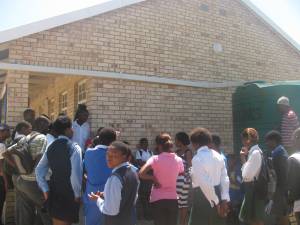How do conversations start? Like a chemical reaction, a conversation can either be spontaneous or in need of a catalyst of some sorts. The result of the conversation is dependent on the initial conditions and the chemicals (people) that are involved. Sometimes you can predict when a conversation will occur but other times they come unsuspected, in the dark.
Such a conversation pounced on me not too long ago. So, let me set the scene. The people that come to Zithulele all have their own unique story of how they ended up here, far away from the world that many of us city kids know and are familiar with. I have my story. The short of it is that beyond my love for learning and want to pass on that love to others, I believe that empowering someone to get an education in the way that the world now requires is one key way to solving a number a issues in South Africa. This is ever more real to me after my brother was murdered two years ago. Maybe if there was less poverty there would be fewer murders? And how does poverty decrease? I guess with education. Finding a way in which I could aid education, I ended up here in Zithulele.
I don’t tell many people my story. But somehow I told it to another Zithulele arrival. Someone who comes from a completely different background, but who shares a similar story. It’s not my place to tell another person’s story, but what struck a chord in me were his words “You’ll never understand what it’s like to live in the township”. A reminder of how lucky I am to have been born into an easy life, where education just happens and before you know it, you have a degree. Simple as that. I will never understand what it is like to grow up in a township, to be educated in a township. Township life is full of life and energy. But it is also full of crime and violence. Ironically, a place where you rarely see police patrolling. I’ll never know what it is like to be rejected from clubs just because you are black, while you watch a group of white people walk straight past you into the club unquestioned. And I’ll never know what it is like to see your parents, who lived through the meat of Apartheid, making do with the few opportunities that were given to them, because when they were young their dreams and aspirations could never be fulfilled.
Yes, South Africa we are unified through diversity as our motto proudly reads. But the majority of people still live in separate places. Just last year I was told by a black person after a workshop,”This is the first time I’ve gone out in the evening with white people as my friends as well ” – An example of the kind of things that are still going on in South Africa. Many criminals are people of colour, why is that? Maybe, it is because many of these people are the poorest and have the least education as a result of Apartheid. So, possibly they didn’t grow up during Apartheid, but try going through schools that are dysfunctional and overcrowded. And then try doing homework but not being able to ask your parents questions because they grew up in Apartheid and thus didn’t get the opportunity to go through this schooling system. Try getting an education without access to a library or internet. It’s possible. But think about how much you rely on these resources. Racism isn’t the issue but we have a long way to go before the legacy of Apartheid is conquered, so let’s not forget where we are coming from.



